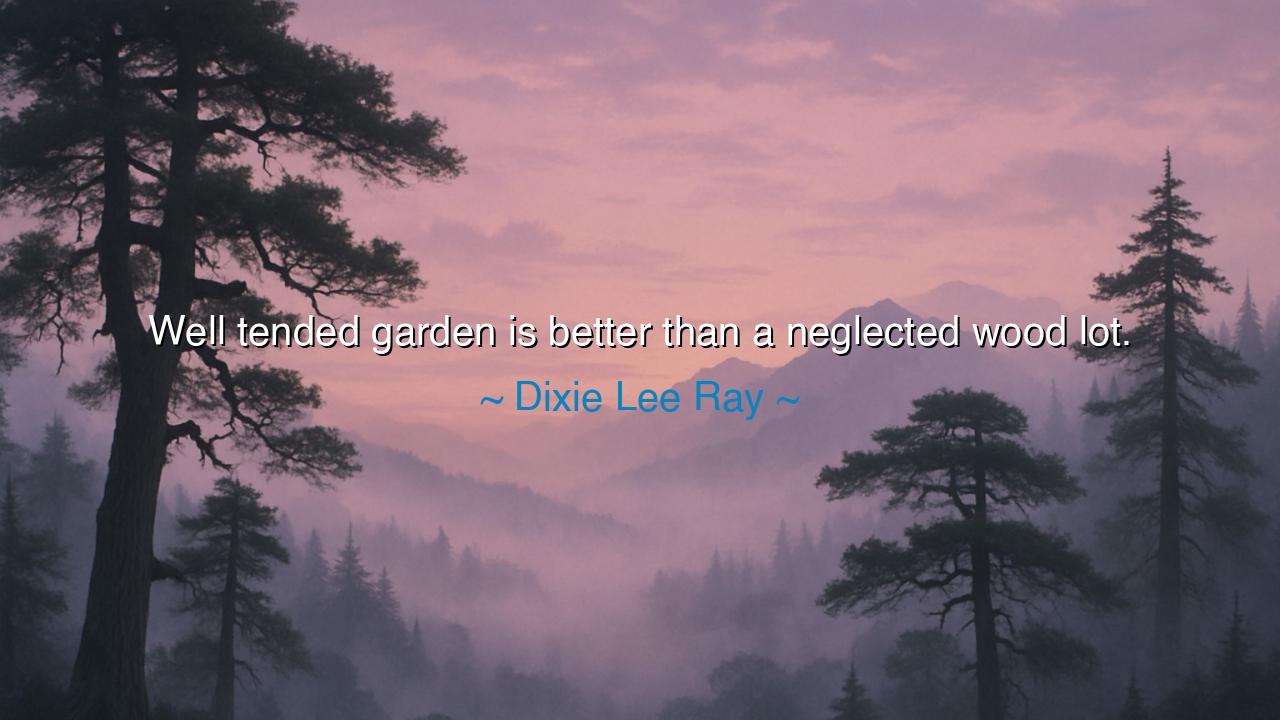
Well tended garden is better than a neglected wood lot.






The words “A well-tended garden is better than a neglected wood lot” were spoken by Dixie Lee Ray, a scientist, environmentalist, and former governor of Washington State. Though her statement appears simple, it contains a profound truth — one that touches the very heart of human responsibility and the moral order of creation. In this line, Ray speaks not only of gardens and forests, but of life itself: that care, discipline, and attention bring forth harmony and beauty, while neglect, however vast or wild, leads only to decay. It is a lesson about stewardship — of the earth, the soul, and the society we build together.
When she praises the well-tended garden, she honors the sacred bond between humankind and the living world. The garden is not merely a patch of soil; it is a symbol of order born from love. Every trimmed leaf, every turned bed, every watered root is an act of devotion — the gardener’s quiet dialogue with nature. In tending the garden, one transforms chaos into form, waste into abundance. The neglected wood lot, by contrast, represents abandonment: the loss of care, the absence of discipline, the slow surrender of life to disorder. Through this contrast, Ray reminds us that greatness lies not in vastness or might, but in nurture — that the smallest field, lovingly tended, holds more worth than a forest forgotten.
Her words echo the wisdom of the ancients. In every civilization, the garden has stood as a metaphor for the soul. The Persians called it paradise, a place where human hands worked in harmony with divine design. The Chinese sages spoke of it as a reflection of inner balance — a realm where stones and streams mirrored the order of heaven. Even the biblical story of Eden speaks of this union: that humanity’s first task was not conquest, but cultivation. To tend the garden, in Ray’s sense, is to participate in the ongoing act of creation — to sustain life through effort, patience, and reverence. Neglect, however, is a rejection of this sacred duty.
History, too, bears witness to this truth. Consider George Washington Carver, the humble scientist who transformed poor Southern soil into fertile land through care and innovation. To him, every plant was a teacher, every patch of earth a living laboratory. Through decades of devotion, he restored life to what had been barren, teaching farmers that respect and stewardship were greater powers than greed or indifference. His “well-tended garden” was not only literal but moral — an emblem of what human love and discipline can achieve when joined with nature. By contrast, the great stretches of land left untended by those who exploited and abandoned them became “neglected wood lots” — reminders of what is lost when care gives way to complacency.
There is also a spiritual dimension to Ray’s wisdom. The garden is not only the world outside us but the one within — our hearts, our minds, our relationships. When we cultivate them with patience, pruning pride, watering kindness, and pulling out the weeds of resentment, we create inner order and peace. But when we neglect them, they grow wild with confusion and sorrow. Even the most gifted mind or the richest soul can become like a tangled forest if left untended. Thus, the tending of the garden becomes a lifelong practice — the art of keeping both our inner and outer worlds alive through attention and care.
Her quote also holds a lesson for how we approach civilization itself. A society that tends its “garden” — its values, communities, and environment — will flourish, while one that neglects them, no matter how vast or resource-rich, will decay. The well-tended garden stands as a symbol of sustainable harmony: limited in size but limitless in depth. The neglected wood lot, by contrast, is the illusion of abundance — large, but empty of vitality. Through this lens, Ray calls upon humanity to act as stewards, not conquerors; to choose care over possession, and to remember that true prosperity is not found in scale, but in intention and diligence.
The lesson, then, is timeless and clear: value what you can tend. Whether it is a garden, a relationship, a craft, or a community, greatness is not measured by how much you own, but by how deeply you care for what you have. Practical actions: Begin with what lies within your reach. Cultivate it with patience and devotion. Do not envy the vast forests of others if you have only a small patch of soil — make it flourish. Weed out negligence, nurture what is good, and let your care bear fruit. For as Dixie Lee Ray reminds us, the worth of a life, like the worth of a garden, is measured not by its size, but by the love with which it is tended.






AAdministratorAdministrator
Welcome, honored guests. Please leave a comment, we will respond soon